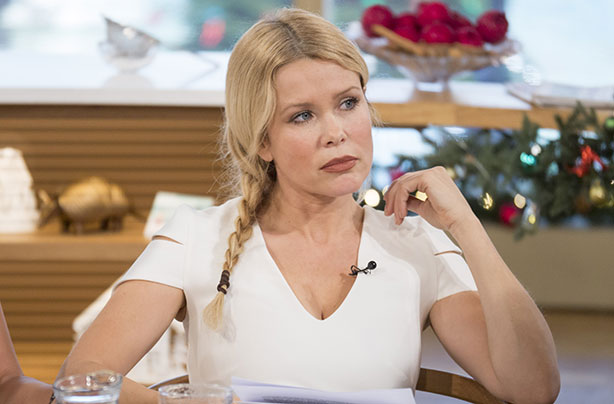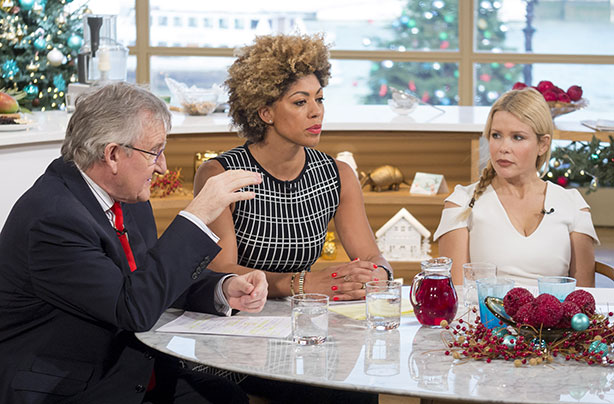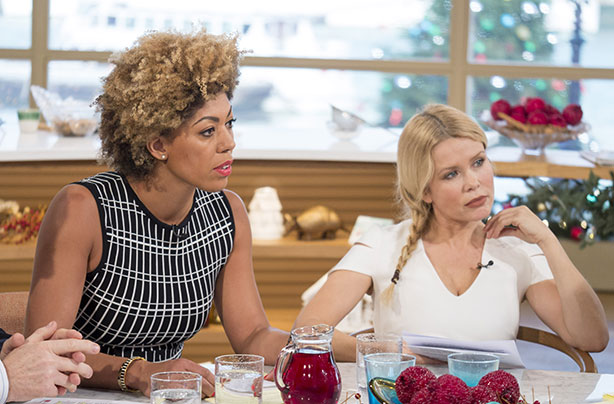Melinda Messenger sparks HUGE debate after revealing she won't give daughter the HPV vaccine
Do you think she was right not to vaccinate her daughter?

Melinda Messenger has divided opinion over her decision to not let her daughter have the HPV vaccine.
The mum and TV presenter, 45, appeared on This Morning to raise her concerns over the vaccine currently offered to girls aged 12-13 years.
In the UK, the NHS use a vaccine galled Gardasil in their vaccination programme. The vaccine protects girls against two types of human papilloma virus (HPV) which causes over 70 per cent of cervical cancers in the UK. It's thought that about 400 lives could be saved a year by vaccinating girls before they are infected with HPV.
Melinda told hosts Philip Schofield and Holly Willoughby that she was worried about the link between the vaccination and chronic illness, so is holding off letting her 13-year-old daughter, Evie, have the vaccination until she's carried out more research.

While Melinda said she wasn't against vaccinating Evie in the future, she still had worries about the HPV vaccine. She said: 'I had an uneasy feeling. It's a brand new vaccine - I really don't know anything about it. I'm going to inject my daughter with it, a drug, I do at least need to know what I'm injecting her with, what the potential side effects might be, and if it's right for her. I did some research, and it caused some alarm bells to ring.'
She added: 'The number of cases of girls who had reported serious side effects, so they were going through auto immune diseases, premature menopauses, having ovarian failure.
'Obviously, this has not been scientifically linked to the vaccine but all the families will say the same thing - that their girls were healthy.
GoodtoKnow Newsletter
Parenting advice, hot topics, best buys and family finance tips delivered straight to your inbox.
'Fit and healthy active 12-year-old girls, post this vaccine, then go on to have all of these serious illnesses.'
However, Doctor Zoe disagreed with Melinda, saying: 'There is nothing to support that the vaccination is linked to chronic disease. I strongly urge people to have the vaccine as it could save your life.'
She added that chronic illness could happen after a jab, but that is no reason to believe that it was caused by the vaccine. She said: 'In a year, these teenagers might still have had chronic illnesses, it's no surprises they may want to think there is a link. But they may have fallen ill anyway.'
Dr Zoe also argued that the side effects are just reports of links. She said: 'Millions of pounds have been spent on researching it. It's the safest drug we've had'.

Philip also revealed that both of his daughters have had the vaccine.
Meanwhile, Doctor Chris slammed Melinda for voicing her concerns on live television and argued this could put people off from having the potentially life saving vaccine.
He said: 'What upsets me, Melinda, is that you've done this in the public domain. You could have done this privately. This will affect people.' Her comments have since divided social media, with many slamming the mum saying she is denying her daughter an important vaccination.
One person said: 'Melinda should be ashamed of herself unnecessary panic to others this is a safe vaccine she could cause more harm than good'. Another argued: 'Having had cervical cancer I wouldn't hesitate in advising girls to have the jab. It wasn't available to me'.
However, others have praised Melinda for voicing her worries and argued that many mums feel the same. Twitter user Caro said: 'Thank you to Melinda for asking the questions so many of us have. And well done for having your last word too!'
Another said: 'Melinda was just asking the questions that every parents wants to ask. She has been ganged up on this morning unfairly.'
What is HPV?
The human papilloma virus (HPV) is a name given to a family of viruses. There are over 100 types of HPV, while 40 of these viruses can affect the genital area.
Some HPV infections show no symptoms, while others can cause warts (including genital warts) or veruccas. In serious cases, women with high risk types of HPV can develop cervical cancer. According to the NHS, 99 per cent of cases of cervical cancer occur when an individual has a history of high-risk types of HPV.
HPV infection can also lead to anal cancer, cancer of the penis, some cancers of the head and neck, warts on the voicbox or vocal chords (known as laryngeal papillomas). It can also cause vaginal or vulval cancer but should be noted that these types of cancer are rare.
Charlotte Whistlecroft is a former Family writer at GoodTo. She obtained a BA in Theology and Theological Studies at Durham University, going on to study a masters at City University London in 2016. Since leaving GoodTo she has worked as a Social Video Researcher at Mail Online and is now Assistant Producer at BBC Sport.

